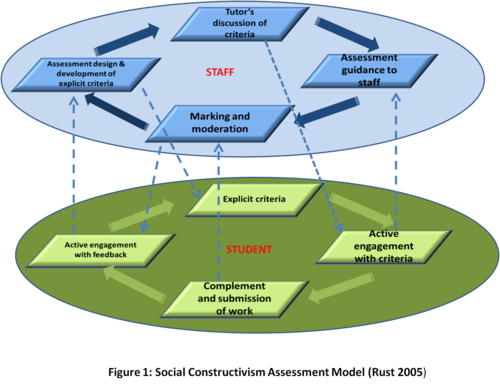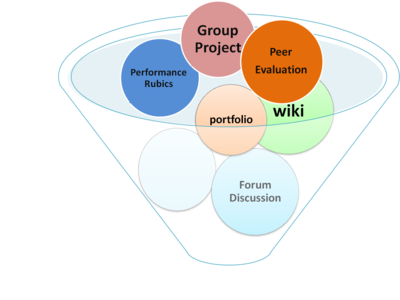Social Constructivism Assessment/SC learning
Contents
What is Learning? The social constructivist perspective
Social constructivism emphasizes individuals working together to construct and develop ideas through dialogue, building on prior knowledge and understandings. (Vygotsky, 1978) Here, the importance of culture, context and social interaction are particularly emphasized. For the social constructivist, reality cannot be discovered: it does not exist prior to its social invention. Knowledge is socially and culturally constructed (Ernest, 1999; Gredler, 1997; Prat & Floden, 1994, as cited in Kim, 2001)). Individuals create meaning through their interactions with each other and with the environment they live in. Learning is a social process. It does not take place only within an individual, nor is it a passive development of behaviors that are shaped by external forces (McMahon, 1997). Meaningful learning occurs when individuals are engaged in social activities.(Kim 2001).
What is Assessment? The social constructivist perspective
Elwood (2002) argued that the model of the learner and of learning is fundamental both to how assessment is designed and how we understand responses to the items or tasks set. So we cannot review systems of assessment without acknowledging the relationship to the view of learning and of the learner underpinning it. Traditionally, assessment is viewed as a means for verifying student learning and is occurs after learning has already taken place (Anderson, 2006). It is externally imposed and based on an assumption that “the majority of what is to be learned is already known, digested and organized.” (Short and Broke, 1991, p60, cited in Anderson,2006).
Reeves (1996) says that regardless of where one might be on the issue of how much constructivism is appropriate in education, it seems obvious that alternative assessment is absolutely required by constructivism, including social constructivist learning environments. Constructivism claims that the learner can only interpret information in the context of their own experience, and what they interpret will to some extent, be individualised. So the assessment of learning in the constructivist perspective is focused on assessing the student’s learning process rather than explicit knowledge and skills we can easily see (Jonassen, 1992).
Constructivist teachers should employ a range of techniques to gather information about the learner’s improvement in the learning process to assess whether the construction of knowledge is effective and efficient. To a social constructivist, to assess the “construct” is not good enough as it remains non-social. Assessment should emphasise the communal acts of constructing knowledge (Shay, 2008).
Principles of social constructivist assessment
Rust (et al., 2005) argues that it makes no sense for us to treat assessment any differently from learning. Acquiring knowledge and understanding of assessment processes, criteria and standards needs the same kind of active engagement and participation as learning about anything else. He developed a framework with two parallel cycles to present the dynamic relationship in the process of a social constructivism learning assessment. The principle of this framework is that students should be actively engaged with every stage of the assessment process in order that they truly understand the requirements of the process, and the criteria and standards being applied, and should subsequently produce better work.
As Elwood (2006, p. 22) states, assessment is a complex cultural activity situated within “the relationship between the learner, the teacher and the assessment task in the social, historical and cultural context in which it is carried out”.
In a social constructivist context, the difference between assessment and other learning activity is the provision of feedback to the learner as key to future learning. Assessment takes the form of ‘process indicators’ rather than outcome measures. It is formative [1] [2], not summative[3] [4]. It’s assessment for learning, not assessment of learning.
Many tools (listed below) have been designed and applied to learning environments claiming to be ‘constructivist’ in nature. Their aim is to measure participants (beta press) and observers (alpha press) perceptions of classroom environments and their impact on student cognitive and affective outcomes.
Social constructivist assessment tools
The following tools appear in the literature as social constructivist assessment tools:
- wiki
- online portfolio
- forum discussion
- group project
- oral presentation
- critical reflection
- performance assessment rubric
- observation
- clinical interview
- reflective journal
- demonstration
- peer and/or self evaluation

